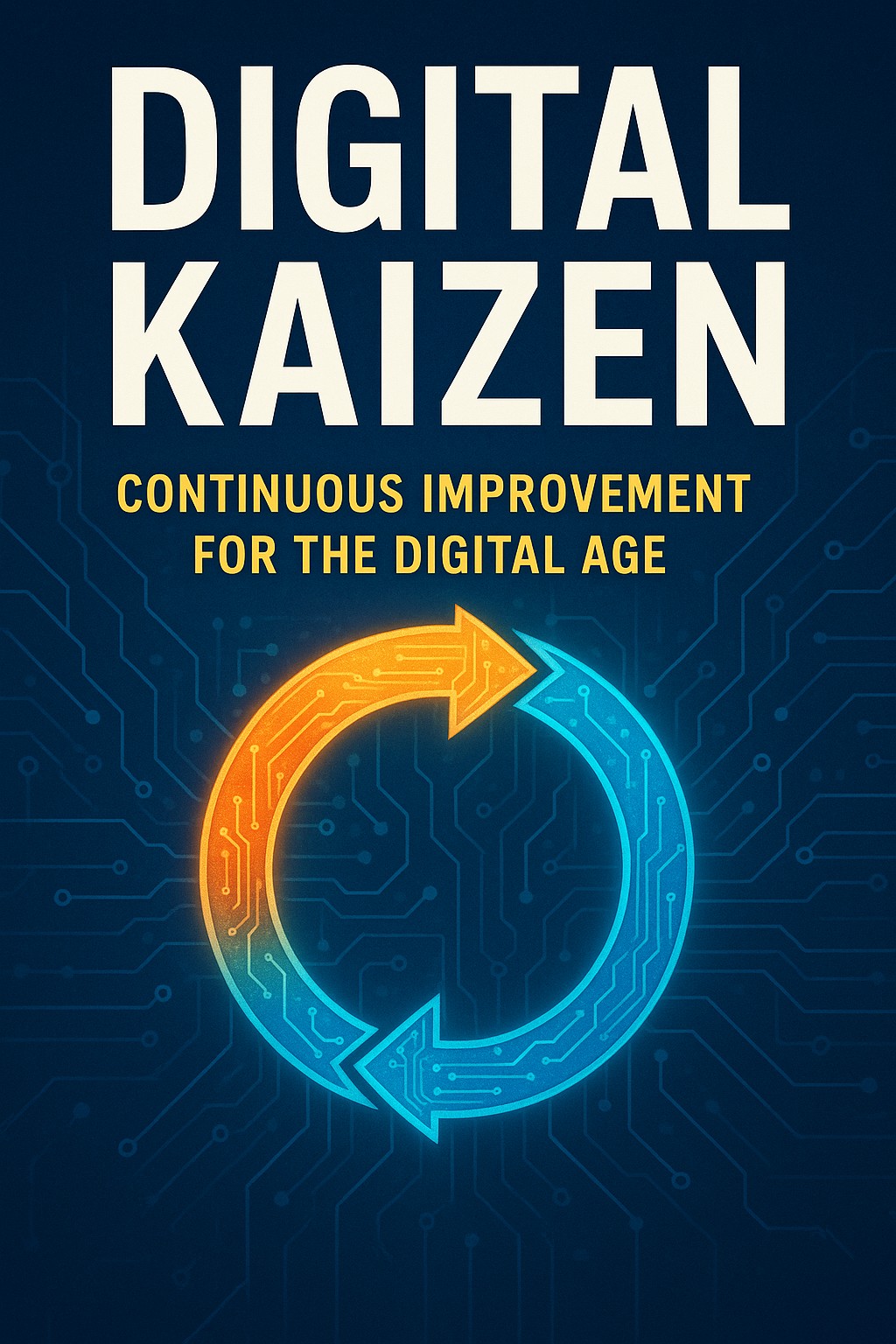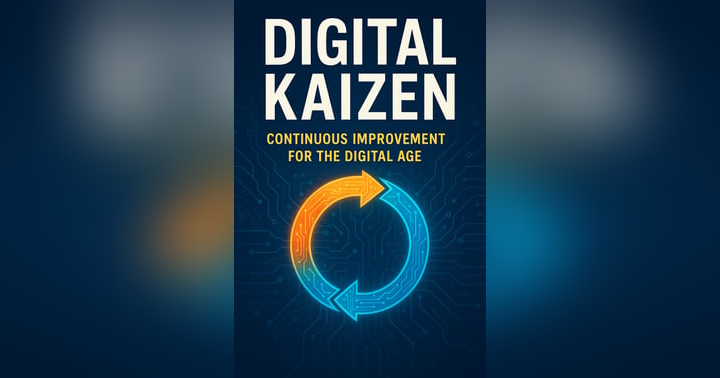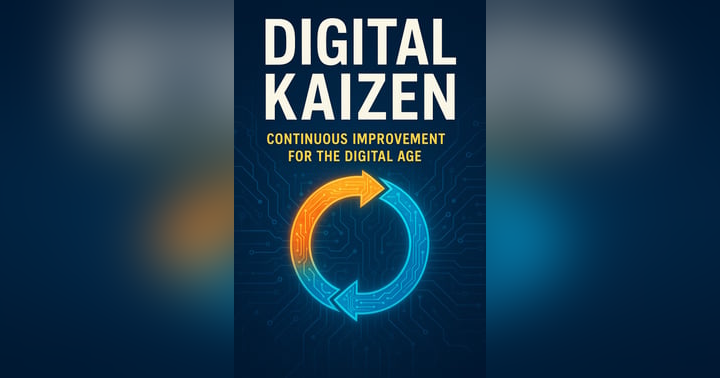This AI Founder Cracked Financial Advisory's Biggest Problem

While financial advisors celebrated 15% portfolio gains, their businesses were quietly dying. Organic growth in the advisory industry collapsed from 8.4% to just 3.6% in a single year—the dirty secret that bull market euphoria had been hiding.
Eden Ovadia calls herself a sellout, and that "sellout" decision saved the industry from itself.
She studied machine learning and software engineering in college, then abandoned the pure tech path for consulting at Boston Consulting Group's private equity team. Most founders would skip this part of their story. Eden leads with it.
That "sellout" decision gave her a front-row seat to two massive trends that most people in financial services missed. Private equity money flooding wealth management while advisors faced a hidden crisis that years of bull market gains had masked.
The crisis? Advisors weren't actually bringing on new clients.
Looking at Eden's journey through my Digital Kaizen lens, I see something remarkable. She didn't just build another AI tool—she created a system where small, sustainable improvements in how advisors work compound into something transformational.
Her platform FINNY represents exactly what I mean when I talk about human-first, tech-assisted solutions.
The Hidden Crisis Behind the Bull Market
While advisors celebrated double-digit portfolio growth, something fundamental was breaking. Organic growth in the advisory industry collapsed from 8.4% in 2021 to just 3.6% in 2022.
Eden saw this firsthand at BCG. "The market was growing between 10-15% per year, which meant advisors revenue was growing at about that pace," she told me. "When your business is doing that well, the last thing you want to do is pick up the phone and start making cold calls or writing cold emails and facing rejection."
Advisors got comfortable with passive referrals. Warm introductions felt good. Cold outreach felt terrible.
But referrals don't scale. And when the market stopped carrying everyone, the growth engine sputtered.
Eden watched private equity firms pour money into wealth management expecting sustainable growth. Instead, they found an industry that had forgotten how to prospect.
That's when the reality hit. Most people would have built a better cold calling system. Eden did something different.
Matchmaking Instead of Mass Marketing
Eden saw the AI spam tsunami coming. "I very quickly did the math," she explained. "AI was about to change the way people do cold outbound and spam was going to increase 100x."
While others rushed to automate more messages, Eden went the opposite direction. She built FINNY around what she calls the F-Score, a compatibility algorithm that predicts how well prospects and advisors will actually get along.
"It's exactly like matchmaking! My co-founder even referred to it as Hinge for financial advisors."
The F-Score looks at three factors: similarity between advisor and prospect, similarity between the prospect and clients the advisor has already converted, and the intersection between the prospect's pain points and the advisor's services.
This is Digital Kaizen in action. Instead of optimizing for volume, FINNY optimizes for relationship quality. Small improvements in targeting create massive improvements in conversion.
The results speak for themselves. FINNY's waitlist now includes nearly 250 firms managing $1.5 trillion in assets.
Learning What Advisors Don't Know About Themselves
Here's where FINNY gets really interesting. Eden discovered that advisors often don't know who they actually convert best.
"Advisors will tell us about their existing book of business when they get started. We ask for details about their clients beyond typical descriptors like age and net worth," she said. "FINNY tries to understand their behaviors, interests, alma mater, marital status to really paint a picture of who the advisor typically gets along with."
Then the platform learns. Continuously. Using online reinforcement learning mechanisms.
"Sometimes the advisor's 'ideal client' is not who they end up converting on the platform."
Instead of confronting advisors with this disconnect, FINNY quietly adjusts targeting in the background. "From the advisor perspective, it will feel like they are just getting better and better at prospecting."
This captures something essential about how AI should work in professional services. The technology learns your actual patterns, not your stated preferences. It amplifies what works without making you feel inadequate about what doesn't.
What fascinates me is Eden's elegant approach to this disconnect. The platform doesn't confront advisors with uncomfortable truths—it simply gets better at serving them.
Before and After: A Day in the Life
Let me paint you a picture of what FINNY actually changes in an advisor's daily reality.
Before FINNY: Sarah, a solo advisor in Houston, starts her Tuesday morning dreading prospecting. She opens a spreadsheet of 200 cold leads bought from a list broker. She crafts a generic email about "comprehensive financial planning" and sends it to 50 prospects, knowing 48 will ignore it and 2 might respond with irritation. She spends three hours on LinkedIn manually searching profiles, taking notes, and crafting personalized messages that still feel forced. By lunch, she's emotionally drained from rejection and hasn't spoken to a single qualified prospect. She questions whether she's cut out for business development.
After FINNY: Sarah opens her dashboard to find 12 pre-qualified prospects who share her background in education, match her existing client patterns, and have pain points that align with her specialties. The platform has already drafted personalized outreach sequences that reference each prospect's alma mater, career transitions, and financial concerns—all compliant and ready for her review. She approves 10 messages, schedules 2 follow-ups, and books 3 discovery calls before 10 AM. Instead of dreading prospecting, she's excited about the conversations ahead. She spends the rest of her morning preparing thoughtful questions for her afternoon client meetings.
The transformation isn't just operational—it's emotional. FINNY removes the soul-crushing spray-and-pray approach and replaces it with meaningful connections at scale.
The shift is profound: from dreading rejection to anticipating connection. From questioning competence to building confidence. From spray-and-pray to meaningful conversations at scale.
Compliance-First AI That Actually Works
Most AI companies treat compliance as an afterthought. Eden made it foundational.
Right before launching FINNY, she got her Series 65 license. "I decided to take my Series 65 and get licensed myself so I could truly put myself in advisor's shoes."
This wasn't just symbolic. It shaped how FINNY handles the personalization versus compliance tension that kills most AI tools in financial services.
"Our AI was purpose built and trained only to serve financial advisors. This means it has full context on the marketing rules and guidelines," Eden explained. "It also means that our AI is not running 'agentic'. Every advisor will approve a sequence before it goes out, ensuring there's a human in the loop but the AI has done 95% of the work."
Human-in-the-loop isn't just a safety feature. It's a design philosophy. The AI handles the heavy lifting. The advisor maintains control and compliance responsibility.
This separation of concerns is brilliant. Advisors get efficiency without losing accountability. Compliance gets maintained without sacrificing personalization.
The Solo Billion Dollar Advisor
Eden's vision extends far beyond prospecting tools. She's architecting how financial advice gets delivered in an AI-augmented world.
"I often think about the solo billion dollar advisor, where the advisor was able to automate and outsource everything except for client face-time," she told me. "In the future, there will be tools that can help with everything except for the human touch, which will become the most important part of the advisor's job."
This aligns perfectly with my Digital Kaizen philosophy. Technology should amplify human capabilities, not replace them.
When I asked Eden what would disappear from current advisory practices, she was definitive: "The entire way advisors currently engage with clients and prospects which is super rigid and generic will completely disappear. So the canned content, the structured conversations during reviews, will be a thing of the past."
What becomes more important? "The advisor actually liking and getting along with their clients."
Think about the implications. When AI handles operational complexity, relationship quality becomes the primary differentiator. Advisors evolve from investment managers who happen to build relationships into trusted guides who happen to manage money.
Democratizing Good Financial Advice
Eden's ultimate goal transcends business metrics. "You're looking at the democratization of good financial advice," she said. "Our goal was to ensure good financial advice to all Americans who want it by empowering the best advisors to find and match with the prospects they are uniquely qualified to serve."
This vision resonates with me deeply. After 22 years in financial services, I've seen too many people get mediocre advice because the best advisors couldn't find them efficiently.
FINNY solves this through what I call beneficial constraint. By focusing exclusively on financial advisors, Eden built something that works better than general-purpose tools. Vertical-specific AI creates more value than horizontal solutions.
The consulting experience Eden initially called "selling out" gave her the industry credibility that pure tech founders lack. "Especially in financial services there's this slight cynicism towards the Silicon Valley tech type that comes in with fancy solutions for problems that don't exist," she noted.
She separated herself by understanding the real problems first.
Here's the difference: Generic AI tools promise to help "everyone with everything." They're built for maximum market reach, minimum industry depth. They know nothing about Series 65 compliance, fiduciary responsibility, or why a teacher's pension rollover conversation is fundamentally different from a tech executive's stock option discussion.
FINNY chose the opposite path. By constraining itself to one vertical, it became exponentially more valuable within that space. It understands advisor pain points, client psychology, regulatory requirements, and relationship dynamics that generalist tools completely miss.
This is what I call beneficial constraint in action. Narrower focus, deeper impact.
What This Means for the Future
Eden's approach with FINNY represents a template for how AI should be deployed in professional services. Human-first design. Industry-specific training. Compliance by design. Relationship amplification rather than replacement.
The broader implications extend beyond financial advisory. When AI handles routine complexity, professionals can focus on what humans do best: building trust, providing judgment, creating connection.
This is the future I envision through Digital Kaizen. Small, sustainable improvements powered by AI that compound into transformational change. Not flashy disruption, but thoughtful evolution.
Eden built something that makes advisors better at being human. That's the kind of AI we need more of.
The question isn't whether AI will change professional services. It's whether we'll use it to amplify our humanity or replace it.
Eden chose amplification. And that makes all the difference.
Here's what keeps resonating with me: Eden's "sellout" moment wasn't a compromise—it was preparation. Sometimes the detour is the path.
Eden's story teaches us something profound about purpose: sometimes what feels like compromise is actually preparation. Her "sellout" years weren't a detour from her destiny—they were the foundation of it. She needed to understand the human side of financial services before she could build technology that truly serves it.
Every advisor I know has moments of doubt about their path. Market downturns that test resolve. Difficult clients that challenge patience. Technology changes that feel overwhelming. Eden's journey reminds us that these apparent setbacks often contain the seeds of our greatest contributions.
The woman who called herself a sellout became the architect of relationship-driven AI. The consultant who left pure tech created the most human-centered financial technology I've encountered. The "detour" became the destination.
What if your next breakthrough isn't about avoiding the hard path, but embracing it? What if the experience you're gaining right now—even if it doesn't feel like progress—is exactly what you'll need to serve others in ways you can't yet imagine?
Eden figured that out. The question is: Will you trust your own unexpected journey?
Eden Ovadia is the founder and CEO of FINNY, the first AI-powered, multi-channel prospecting platform built exclusively for financial advisors. With a background in machine learning and private equity consulting at Boston Consulting Group, Eden bridges deep technical insight with real-world advisory experience. She holds a Series 65 license and is on a mission to humanize advisor growth—empowering solo and small-team advisors to connect more meaningfully with the right clients. Her work lives at the intersection of compliance, personalization, and scale—making her one of the most thoughtful voices shaping the future of wealth management.
Chris Hensley is a financial advisor, podcast host, and creator of the upcoming book Digital Kaizen: Small Loops, Big Shifts in an AI World. With over two decades of experience guiding clients through complex financial decisions, Chris now blends his expertise in retirement planning with cutting-edge tools like AI, voice-first thinking, and behavioral science. Digital Kaizen is a philosophy for those who want to grow sustainably in a world that moves fast—combining human wisdom, technology, and tiny, honest loops of improvement. This article is a preview of the ideas explored in Digital Kaizen, due out later this year.👉 Want early access to tools and insights from Digital Kaizen? https://digital-kaizen-book.kit.com/6a16de43b8
Grab the free Digital Kaizen Starter Guide and explore how to build better systems for thinking, learning, and working in an AI world.






